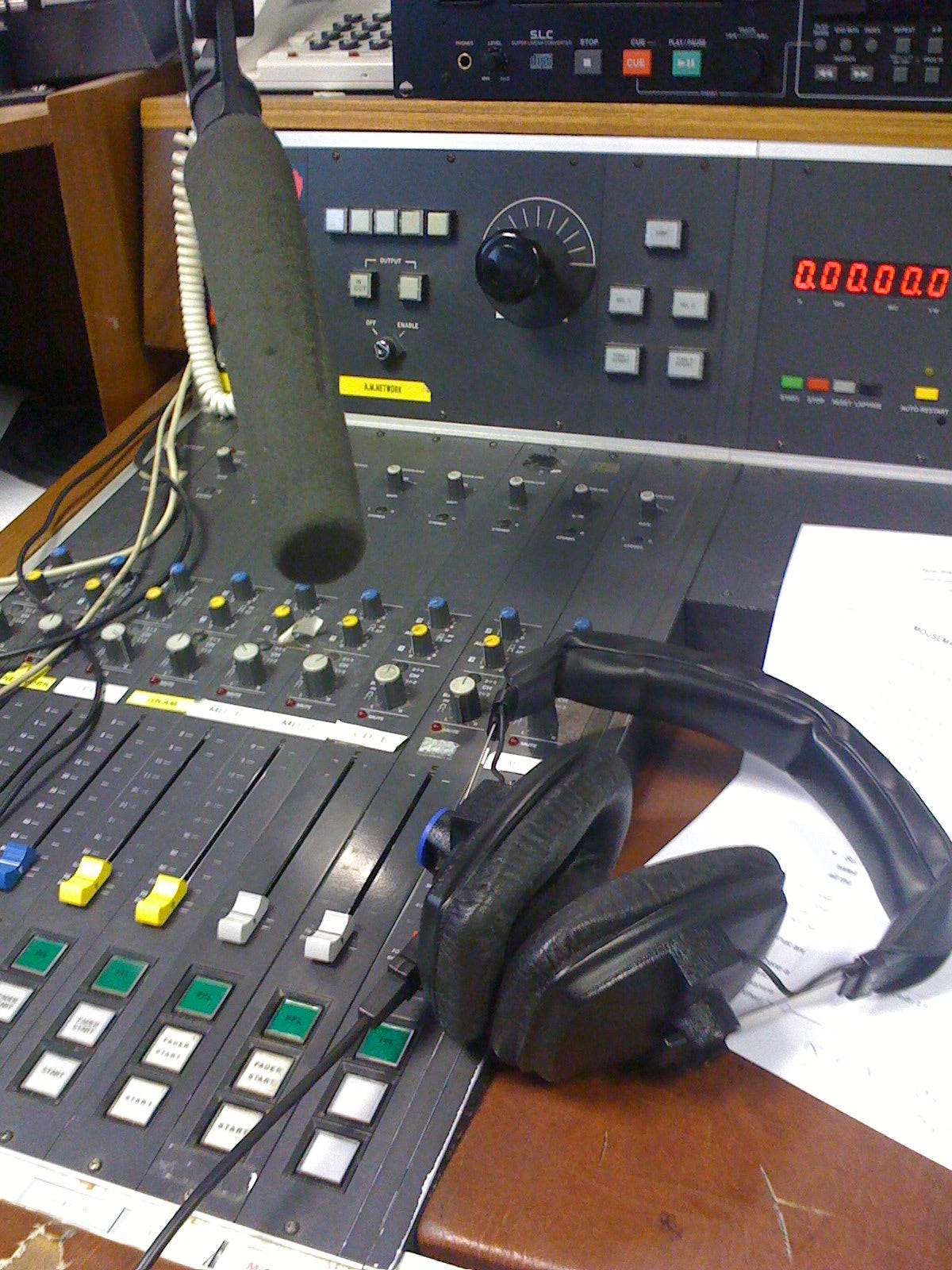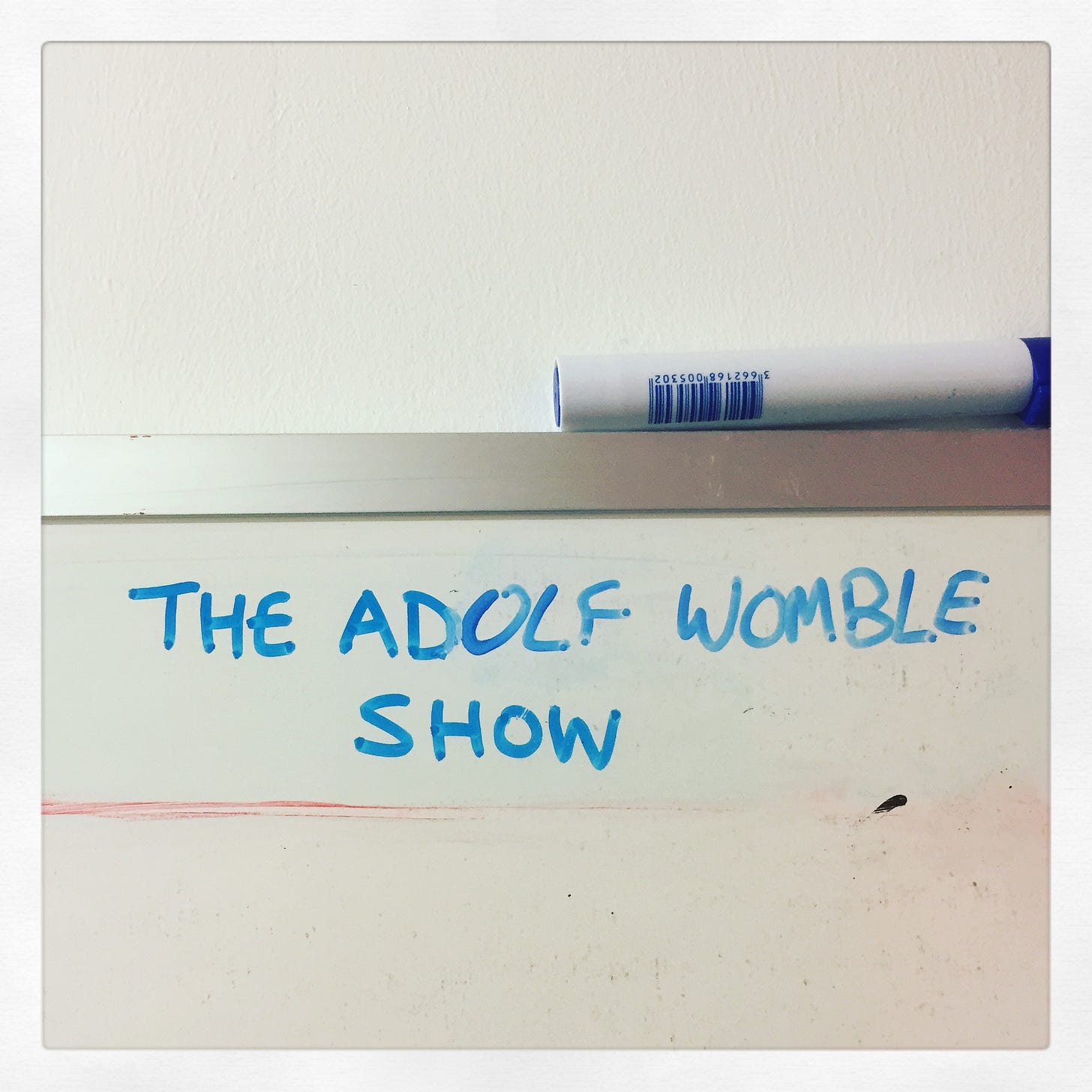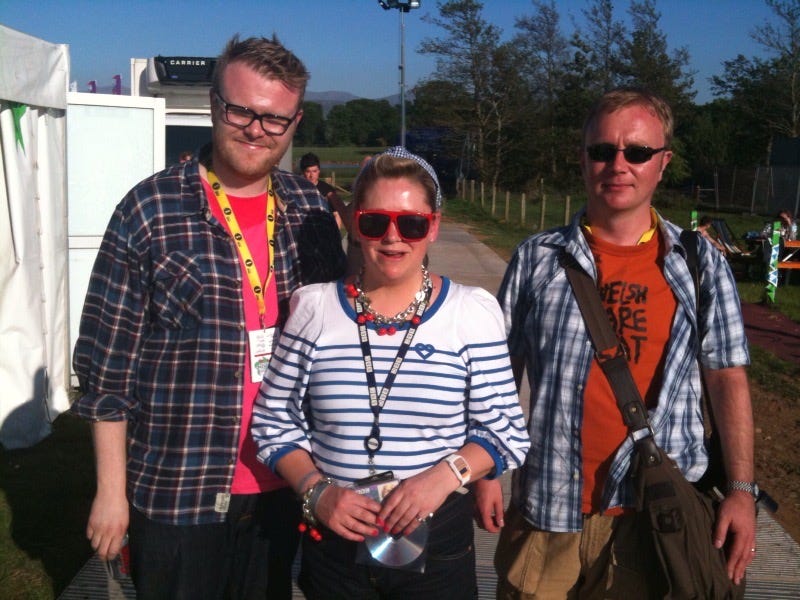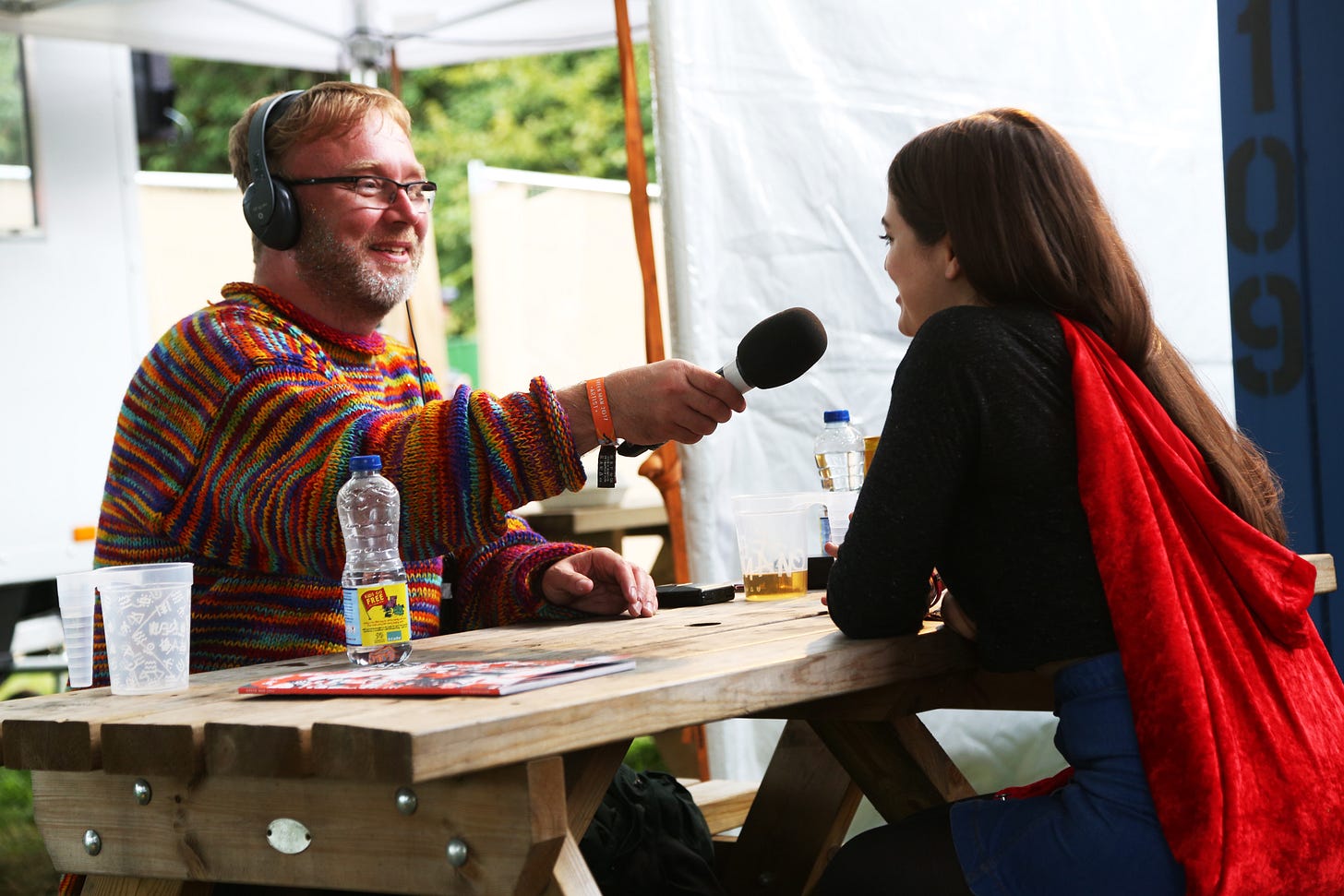Thirty years ago tonight (3rd October 2023), I opened the fader for my first show on BBC Radio Wales. Since that nerve-ridden, scripted and inauspicious beginning, I have been on air more or less every week. I am very much a product of my dad’s work ethic and have only missed a handful of music shows over that period: two programmes due to bereavement; one due to being in Boston, MA when the Boston marathon bombers were discovered, triggering a city-wide lockdown that prevented me from being able to go into studio; once due to Covid (last November). Oh, and once due to nervous exhaustion… the kind you get from never taking any time off because you love your job too much.
My speciality - if I can call it that - has been music programmes. Since the mid-2000’s, this has been programmes dedicated entirely to new Welsh music.
I have also done film reviews; sat in on various Radio Wales afternoon and evening shows; presented a long-running (sixteen years and counting) and excellent science programme, Science Cafe; presented Radio Wales’ first (and only, I think) computer / internet-orientated programme, ‘Mousemat’. I’ve covered sports events (FA Trophy Finals featuring Wrexham, at Wembley). I was asked to broadcast the night of Princess Diana’s death (which seems a remarkably perverse choice, now… maybe the editor at the time was a republican?). I’ve hosted - and co-hosted - live events at a multitude of festivals, science conferences, eisteddfodau and seminars.
I have yet to compere at a garden fête or to open a supermarket. Even after thirty years, I don’t have the profile or the cache.
I contributed a few times to Radio 1 programmes, but didn’t much enjoy the experience. Jane Garvey once ate me alive on 5Live. I have co-presented a couple of programmes on 6Music, but possibly burnt my bridges with them by having the audacity to request payment for my time when Lammo came from Cardiff a few years ago. Wrexham isn’t adjacent to Cardiff. It’s a seven hour round trip. And freelance radio presenters also have to eat and keep a roof over their heads.
That kind of attitude possibly hasn’t served me well. It’s amazing how such outlandish expectations can be an incendiary device under the arches.
It’s likely that the bridges weren’t there to be burnt in the first place. I’m not sure I’ve ever been good enough for 6Music or Radios 1, 2 etc. I can’t do small talk and bonhomie. What I can do is wax too lyrical about a shonky recording done in a shed in Beddgelert by someone with social skills as middling as my own.
It appears that that particular speciality isn’t all that transferable.
I’m sort of happy with this.
When Radio 1 started its ‘Session In…’ regional opt in programmes in the late 90’s, I was considered as a potential presenter for all of five seconds, then I was told that I sounded “too English”. Thus managing the double whammy of having a voice that didn’t fit as much as my face didn’t fit. Wales, you see, to any outsider is rugby, Cardiff, the Valleys and Gavin and Stacey voices that haven’t been modulated by proximity to the border with the other place.
They went with a couple of fledgling broadcasters - at the time - Huw Stephens and Bethan Elfyn. Well, you can’t argue with that. I love them both and I’m glad - now - that voodoo isn’t an exact science.
This piece - rather than passively aggressively highlighting the multitude of chips on my shoulders and other major joints - is supposed to detail what I’ve learnt about radio presenting that might be useful to anyone considering this as a vocation, until AI inevitably makes us all redundant, sometime around June next year.
Here, then, are some random tips - long and short, and in no particular order of importance - for aspiring radio gobs. They’ve been learned in the heat of battle and they’re all things I wish I’d known earlier and - in a couple of cases - wish that I knew now.
1) Don’t drink full fat Coke just before you go on air.
My mum said she struggled to listen to my earliest radio shows because I always sounded like I was on the verge of burping. This was because I was always on the verge of burping. Full Fat Coke has the highest burpific rating. Stay away from it. Also, beware of strong coffee. I had a strong coffee just before I started writing this piece and it doesn’t half make you waffle some nonsense. As you can see.
2) Know your stuff.
Some people just want to be on the radio. The best way to get onto the radio is to have a love and knowledge of the subject you most want to broadcast about. Or to have been on a reality show. Where the word ‘reality’ is being used so ironically, even Alanis Morrissette would finally get it.
If you want to be a music broadcaster, listen to music / love music / immerse yourself in as much music as you possibly can, and then communicate that love as honestly and clearly as you are able.
Listeners know when someone is bullshitting. They can sense over-egged puddings from a thousand paces.
Some of you reading this might feel it’s a bit rich me - the “that’s ace, and - oh - that’s ace, and - by god - this is ace, too”-man - saying that. I’ve met a few people over the years who think it’s somewhat questionable that I like everything that I play, as if natural curiosity and authentic enthusiasm warrant suspicion.
Well, I do like everything that I play. I’m in a rare and privileged position in that I am allowed to choose every track I feature on my Saturday night music show. We could count - on a rattlesnake’s fingers - the amount of times I’ve had content dictated to me that I didn’t want to include.
This is surprisingly rare in music radio - a land shaped by playlists, algorithms, market research, pie charts, deep furrowed thinking and the influence of expensive radio pluggers.
I’m somewhat scared to mention this freedom, as if I escaped a net thirty years ago and my absence hasn’t been noticed, yet. Perhaps by drawing attention to this freedom now, I will hex it, have my editor reaching for the bug spray.
3) If you do have to play something that isn’t to your taste, do it with good grace.
The freedom I mention in 2) only applied to my Saturday night show. I’ve played hundreds of hours of music I didn’t care for over the decades. Even Muse.
No one wants to know what you don’t like, or I don’t like, or what we think we’re too cool to play. Anything that makes the audience feel awkward or remotely uncomfortable is likely to trigger them into changing station (and there is so much choice!)
This is an editor’s second worst nightmare.
4) Imagine you’re speaking with one person, but not someone with whom you’re over familiar.
This is the oldest adage in radio. When you open the microphone, imagine you’re having a conversation with a single human being, not a crowd. Speak with the individual, and not just to them.
I’ve no idea how dizzying it must be to open a fader in the knowledge that millions of people are listening. I know what it’s like to broadcast to tens of thousands. If you think about it, it would turn your insides to water. So, yes, imagine it’s one person that you’ve having a conversation with; but also imagine that that one person - while valuing your friendliness and integrity - mightn’t see the world in exactly the same way as you do.
Making assumptions for your audience, trotting out generalisations, is a real turn off for me. Radio is riddled with phrases like “everyone knows” or assumptions about what “everyone is talking about”, and it tends to reduce the audience to a homogenous blob.
The audience is smart, curious, keen to be transported, and they’ve chosen you, above the multitude of other available options, to be their companion. Respect and value that.
5) Don’t panic. D O N T P A N I C.
Despite what editors / deputy editors / senior producers / producers / audio engineers / broadcast assistants and line managers might think… it is only radio. No one is likely to die if you press the wrong button, miss a cue or fail to fill every millisecond of a broadcast seamlessly.
Concentration and doing your best to get things right is paramount, of course, but don’t oversweat the relatively small stuff at the expense of the listener’s experience.
Early in my tenure producing the legendary Janice Long (please do look her up), there was a brief power cut (in a studio that allegedly has a very expensive uninterruptible power supply) that crashed all of our broadcast systems. Every piece of music - these days - is played from a networked PC.
All of a sudden, Janice was live on air with absolutely no music to play until the broadcast systems re-booted.
There were three engineers racing around the building in various shades of paroxysm scarlet, pushing countless buttons and switches. Janice sat serene amongst it all, a Scouse-flavoured swan gliding over turbulent waters.
“Nothing gets fixed by losing your head,” she said afterwards.
It’s a maxim worth remembering and - by God - do I miss her.
6) Learn from others.
It does surprise me, the amount of people who want to work in radio who don’t appear to listen to radio. You can learn so much from professional broadcasters. When I started I was inspired by John Peel’s fervent eclecticicity and pig-headedness; by Mark Radcliffe’s humour and sense of the surreal (Out on Blue Six was brilliant, a real touch paper). I loved Simon Mayo and Jane Garvey’s absolute professionalism and the fact that they were respectfully well-briefed and prepared for all of their guests. And they actually listened to them, too.
More recently, Lauren Laverne’s warmth and lightly-worn knowledge is a huge inspiration. As is Huw Stephens’ ability to communicate similarly. I’m fully of the belief that you could throw any situation at Huw and he would make a good listen out of it.
As he proves on a daily, a nightly and an early morning basis. He’s the Duracell bunny of broadcasting, and always delivers.
7) Listen to your guests.
An interview isn’t a conversation, but an interview that isn’t conversational - that is just questions fired at a guest, regardless of the context of what they’re saying - is a bad interview.
Interviews can be nerve wracking and it’s understandable that you - as the interviewer - might gain some comfort from sticking to a pre-ordained set of questions / a brief, but there’s so much more enjoyment to be had from listening to the guest and allowing the interview to steer itself as a conversation would.
This hippy dippy philosophy does not apply to news interviews or necessarily short interviews. However regardless of context, it’s always imperative to listen to your guest(s) and to not just think about the next question you’re going to ask. This isn’t a revelation of Stephen Hawking proportions / gravitas but you’d be surprised how many interviewers forget to listen.
8) Don’t waffle and babble.
Yes, I know. I’m fully aware of my limitations. My brain and my mouth have an interesting relationship. My brain thinks it’s a quantum computer operating at a multitude of levels of simultaneous potential - entanglement a go-go. In reality it’s a ZX81 (ask your grandparents) with a RAM pack intermittently connected, and covered in a suspicious sticky brown liquid.
If a squirrel became sentient, that’s my brain.
My mouth is the schoolfriend who wanted to trip you up in front of the girl you had the biggest secret crush on; who’d Sellotape ‘KICK MY ARSE FOR A QUID’ on your back at dinnertime; and shake up a can of pop before passing it to you, all innocent, like.
You don’t have to be like me. Only I have to be like me. Less is always more when it comes to what you say down a microphone. Especially on music radio where you always have recourse to play the next song. No one will complain about an extra couple of songs.
If I’m given the opportunity to continue presenting radio (never a given in a landscape increasingly populated by celebrities rather than specialists) this is what I most want to improve on. I’m a dreamer, I believe.
9) Be you.
And have confidence in your you-ness. Radio’s the best medium for interesting, interested and empathetic introverts. We don’t all have to be Class A gobshites. A bit of vulnerability and humanity can go a long long way with an audience.
10) HAVE FUN.
I’m likely to add more to this as the week’s progress.
Your thoughts - kind ones - are, of course, welcomed.














What a wonderful read.